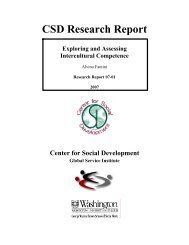Rediscovering social investment in developmental welfare state ...
Rediscovering social investment in developmental welfare state ...
Rediscovering social investment in developmental welfare state ...
You also want an ePaper? Increase the reach of your titles
YUMPU automatically turns print PDFs into web optimized ePapers that Google loves.
R E D I S C O V E R I N G S O C I A L I N V E S T M E N T I N D E V E L O P M E N T A L W E L F A R E S T A T E P O L I C I E S :<br />
B A C K T O T H E F U T U R E<br />
Developmentalism expla<strong>in</strong>s the possibility of susta<strong>in</strong>ed substantial <strong>in</strong>terference with the market with<br />
m<strong>in</strong>imal adverse consequences. If market failures are widespread and <strong>in</strong>terconnected, governmental<br />
actions to address these could very well have positive effects. Developmentalism suggests that a<br />
particular version of <strong>in</strong>formation failure broadens the scope for <strong>in</strong>tervention based on the<br />
importance of merit goods. Specifically, <strong>in</strong>formation failures, <strong>in</strong> the context of dynamic efficiency<br />
(McCartney, 2004), open the door to merit goods (Musgrave, 1957, 1959). The notion of merit<br />
goods is controversial (e.g., Jansson, 2006; Head, 2007) but generally refers to goods that have<br />
positive externalities, where the <strong>social</strong> benefit exceeds the private benefit, and so would be<br />
underconsumed if <strong>in</strong>dividuals only consume as much as they prefer. Examples of merit goods are<br />
health care and education (see also Organization for Economic Cooperation and Development<br />
[OECD], 2002). 49 Although sometimes equated with public goods, merit goods are quite dist<strong>in</strong>ct. 50<br />
Barr (1992, pp. 748–749) suggests that these goods are ―a response to a conventional externality<br />
(e.g., clean water) or a consumption externality (e.g., where a rich person‘s utility is dependent upon<br />
a poor person‘s ‗good‘ consumption as opposed to their <strong>in</strong>come).‖ For <strong>developmental</strong>ists, lower<br />
consumption than is <strong>social</strong>ly optimal could occur if policymakers are better <strong>in</strong>formed than citizens: a<br />
problem of <strong>in</strong>formation failure. Underconsumption could also occur if <strong>in</strong>dividuals are myopic shortterm<br />
utility maximizers, who may not choose optimal levels of these merit goods. Developmentalism<br />
suggests that the possibility of merit goods and their correspond<strong>in</strong>g <strong>in</strong>formation failure result <strong>in</strong><br />
market failure and justify larger scale governmental <strong>in</strong>terventions.<br />
Traditionally, the idea is that the government decides what goods and services are merit goods—<br />
which may be subsidized or provided free of charge (so that consumption does not depend primarily<br />
on the ability to pay)—based upon societal values and judgments. But these decisions may also be<br />
made based on consequentialist perspectives: if consumption of merit goods is encouraged, this may<br />
actually lead to <strong>in</strong>creased output <strong>in</strong> the long run. 51 It is less the knowability of the correlation of<br />
49 Merit goods are def<strong>in</strong>ed <strong>in</strong> the OECD Social Expenditure Database and contrasted with <strong>in</strong>come ma<strong>in</strong>tenance<br />
programs. Often associated with the Nordic <strong>welfare</strong> model (Arter, 1999; Kiander, 2004), <strong>developmental</strong>ism suggests that<br />
while it may be possible to identify specific policies as related to merit goods, one should use caution when<br />
characteriz<strong>in</strong>g <strong>in</strong>dividual policies <strong>in</strong> s<strong>in</strong>gular, isolated or l<strong>in</strong>ear ways (e.g., consumption or production) as opposed to<br />
understand<strong>in</strong>g how they <strong>in</strong>teract.<br />
50 Public goods have long been a central concept of public economics (Wuyts, 1992). They are characterized by<br />
nonexcludability and nonrivalry <strong>in</strong> their consumption. They are typically seen as very rare. Public goods are goods that<br />
would not be provided <strong>in</strong> a free market system, because firms would not be able to adequately charge for them ow<strong>in</strong>g to<br />
nonexcludability and nonrivalry. Merit goods are goods that would be provided <strong>in</strong> a free market system, but would<br />
almost certa<strong>in</strong>ly be underprovided ow<strong>in</strong>g to the fact that the market only takes account of the private costs and benefits and<br />
not external benefits that may arise to society.<br />
51 Compared with traditional market failures (Bator, 1958), market failures due to imperfect <strong>in</strong>formation and miss<strong>in</strong>g<br />
markets may be widespread <strong>in</strong> the economy. Problems of moral hazard and adverse selection may be endemic to all<br />
market situations. Given the possible theoretical pervasiveness of such failures, Stiglitz (reflect<strong>in</strong>g the second-best<br />
position) notes that the costs of adm<strong>in</strong>istration of corrective taxes might well exceed the benefits of a given policy. The<br />
confidence <strong>in</strong> the efficiency of market solutions reduces hand-<strong>in</strong>-hand with the confidence <strong>in</strong> the government to correct<br />
them. If <strong>in</strong>formation failures are as extensive as believed, piecemeal <strong>in</strong>terventions become less effective as they are likely<br />
to give rise to distortions and overlook complementarities. When th<strong>in</strong>k<strong>in</strong>g about the implications of this for <strong>social</strong><br />
policy, two of the major problems that hamper the actions of governments—limited <strong>in</strong>formation and distortions<br />
(<strong>in</strong>centives are also particularly important)—may be alleviated by DWSP. If a broad array of <strong>social</strong> factors have positive<br />
economic implications (e.g., factors highly correlated with poverty but exogenous to the <strong>in</strong>dividual), the need for specific<br />
<strong>in</strong>formation is reduced as a wide array of factors contribute to economic performance. The possibility of distortions,<br />
recognized <strong>in</strong> Abba Lerner‘s (1944) dim<strong>in</strong>ish<strong>in</strong>g marg<strong>in</strong>al utility, are m<strong>in</strong>imized to the extent that benefits m<strong>in</strong>imize<br />
moral hazard that results from rely<strong>in</strong>g heavily on <strong>in</strong>come-based eligibility. Lipsey (2007) has noted that piecemeal<br />
changes are more feasible <strong>in</strong> a parochial, specific policy context than when mak<strong>in</strong>g judgments about an entire society‘s<br />
C E N T E R F O R S O C I A L D E V E L O P M E N T<br />
W A S H I N G T O N U N I V E R S I T Y I N S T . L O U I S<br />
35
















